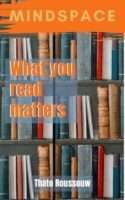The first book I remember reading for reasons other than school work was “Down Second Avenue” by Es’kia Mphahlele, back in 2007. I had gone through a very traumatic loss at the time and, since I lived close to the library, found myself hanging around it for hours at a time. I eventually picked up the book during one of my visits to the library and, unknowingly, started a reading journey that has seen me read hundreds of books over the years.
Since then, I have read on average 20 books a year, which, according to the 2016 South African Book Development Council Report, titled “National Survey into the Reading and Book Reading Behaviour of Adult South Africans” , puts me ahead of around 75% of adults in the country. According to the study, only 25% of adults in the country read books, and the others who read for leisure, who make up around 45% of adults in the country, read newspapers, magazines, blogs, online comics, and other sources.
I know, the numbers are confusing, but here’s the short version: 70% of the adult in the country read for leisure, and only 25% read books .
For some people, the fact that 70% of adults in the country read for leisure is a good sign. But for others, the fact that only a small number of them read books is really concerning. For the first group, it doesn’t matter what a person reads, what matters is the fact that they read in the first place; while for the second group, in which I personally belong, what you read is just as important as the fact that you read.
Over the years, I have learned that reading is an experience that involves more than just taking in words written on a paper. By reading, a person builds a storage of information that they go through whenever they need to find ways to deal with the problems they face in life. This, I believe, is done through reading things that show how people in the past dealt with the issues that so many of us struggle with today, and for me, it takes good quality information to build the kind of mental resources a person will need to successfully go through life.
A good example of how this works is how, for me, the same book I remember being the first one I ever read outside of school work helped me years after I had first read it in 2007. In 2015, which was almost ten years after I had read Es’kia Mphahlele’s memoir, the book played a big role in helping me decide which career to choose. During that time, I had been struggling to decide what it was I wanted to do as a career for a long time, and had been torn between choosing what I considered to be my passion, which was telling stories, and what everyone around me said would work for me, which ranged from engineering to medicine to law.
At one point during those struggles, I remembered what I had read in Es’kia Mphahlele’s book. I remembered how he wrote about using his writing to help tell the stories about the people he lived with, how he found his identity through telling the stories of the people who were left out of the stories of this country, and that was when I decided to become a writer. In the end, it was because of a book I had read almost ten years before that led to my decision to become a writer, and I have lived happily ever since.
Don’t get me wrong, though. This is not to say that other reading sources are not able to give the same information as books can. I know a few blogs and websites, Fundza being one of them, that are more than capable of doing this. What I’m, rather, saying is that in order to build the kind of mental resources required to successfully make it through life, it is going to require you to supplement the blogs and websites with books that focus on the kind of topics you need to read better.
Like many people, I’m happy that a lot of adults read for leisure, even if it’s just for four hours a day. But, the fact that most of them spend their reading time not reading books is concerning. What we read matters, because one day it will help us make some of the most important decisions of our lives, and, because of this, I really believe we need to choose what we read with enormous care.
Tell us: do you agree that we should choose what we read carefully? What reading matter has affected your life?


